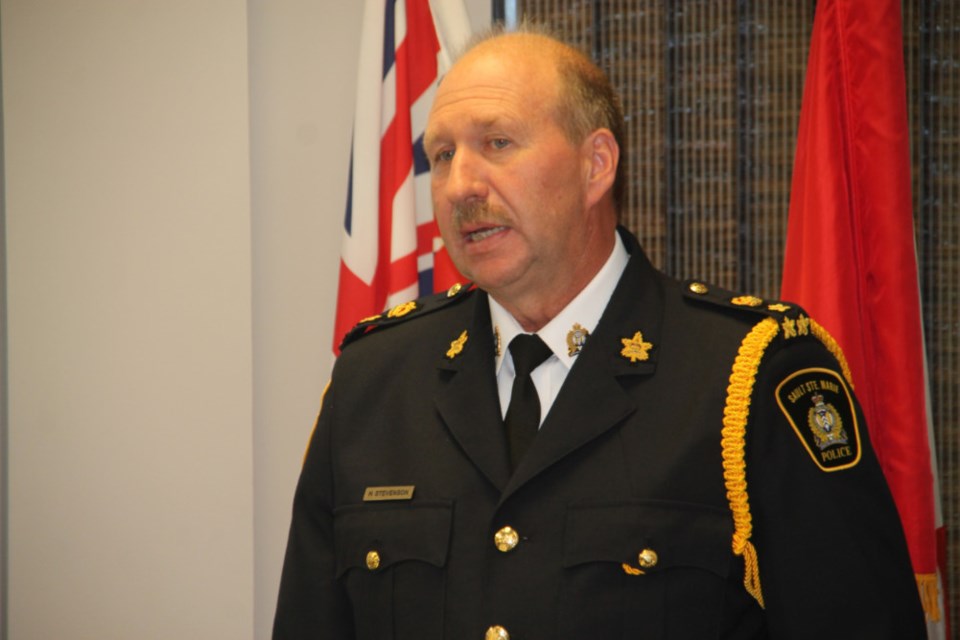To put it bluntly, Sault Ste. Marie Police Service Chief Hugh Stevenson doesn’t think defunding the police is such a good idea.
An online petition released earlier this month calling on the City of Sault Ste. Marie to transfer 10 per cent of its police budget to social services has garnered more than 2,800 signatures as of Friday.
But Stevenson says it’s the partnerships that have been formed with the hospital and community agencies - in particular, the Community Crisis Response Team (CCRT) - that will have more of an impact upon public safety.
“It causes us to look and always self-evaluate our own institutions and where we’re going. Everyone has the right - and I firmly believe this - to speak their mind and look for a variety of ways to do things better,” said Stevenson, when asked about the local push to defund his force’s budget. “I personally don’t think defunding the policing is the way to go. What I believe in is furthering the partnerships in the community to deal with the issues that we have as a community, and I have absolutely no problem with people raising the issue.”
“But sitting in a position of authority and with data, we know the calls for service we go to, and some of them present very dangerous scenarios right at the beginning,” he continued. “The benefit of the CCRT is that we can protect both the mental health industry worker as well as our member (officer). We can de-escalate the situation, we can gain room between us and the situation, we can let things slow down and deal with things appropriately.”
On Thursday, the Sault Ste. Marie Police Service Board heard that Sault Police will collect data on crisis calls related to mental health and addictions over the next three months in order to make a case to the provincial government for a further expansion of the CCRT, which sees officers with pair up with nurses - both equipped with mental health training - on crisis calls.
“To be honest with you, the defund policing argument facilitates the expansion of this program, because what it’s doing is, it’s absolutely including mental health workers assisting the police in mitigating these very dangerous scenarios,” said Stevenson. “In addition, it’s also the education of our own members on this specific issue in mitigating mental health crises.”
Body-worn cameras a no-go, but never say never
Amid calls for the RCMP and other police forces to put body-worn cameras on its front-line officers - following allegations of police brutality towards Indigenous people and system racism with police ranks - the police chief says there’s simply no need to take on the “significant” costs associated with the devices.
In November 2013, SooToday’s Darren Taylor reported that Sault Ste. Marie Police Service was seriously considering the purchase of 30 body-worn cameras - at about $1,000 each - but according to the current police chief, those plans were subsequently kyboshed in 2014 due to concerns over policy and data storage.
“There are significant costs associated with body-worn cameras. There’s pros and cons to it in terms of, does it capture the entire scenario, privacy issues with both the member and the public,” said Stevenson, speaking with SooToday Thursday. “At this stage though for this community, I firmly believe that transparency of the police has been demonstrated quite well.”
“I believe the officers and our board and our command staff do our best to demonstrate our commitment to public safety. And I can’t say that we will never have them. At this point, I don’t see the need specifically for this community, and the budget issues associated to it are significant.”
Better to build relationships than buy body cameras: Police chief
When asked about the police service’s record on race relations under his watch, the Sault’s police chief says that building relationships with diverse groups - along with transparency and accountability - will do more for Sault Ste. Marie Police Service than putting body-worn cameras on front-line officers in the long run.
Stevenson points to the force’s collaboration with Algoma University in having Sault police staff taking part in Shifting Indigenous Frontline Tactics (SHIFT) training, a course designed to help inform officers when dealing with Indigenous people, families and situations.
“I think the biggest mistake police leaders can ever make is that we’re there and we’re good. I would say there’s always improvements with the Indigenous community, with LGBTQ community, with ACCANO (African Caribbean Canadian Association of Northern Ontario), with a variety of diverse groups in our community and continue building the relationship,” said Stevenson. “I just don’t think body cameras do that. I think what works is transparency, accountability, sitting down with these folks on a regular basis, listening to their concerns and acting on their concerns.”
“I think that has more value...than a digital camera on an officer.”
